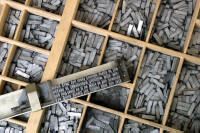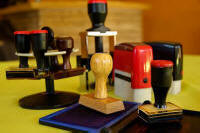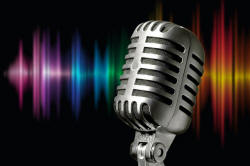Learning to spell in English
 |
Native speakers of English also make spelling mistakes!Lots of them. |
If you read through websites and, often, newspapers and magazines,
you will see that English speakers find spelling difficult sometimes.
That does not mean that it is impossible to spell things correctly in
English.
There are rules!
 |
Why is English spelling sometimes irregular? |
There are four main reasons
- Printers

Early printers were often not native speakers of English, even in England, and the influence of Dutch (their first language, frequently) is seen in, e.g., putting the 'h' in ghost.
When printing first began, nobody knew how to spell words so they spelled them the way they said them. - Borrowed words

English has borrowed lots of words from other languages such as Norwegian, German, French, Spanish and many more. When words are borrowed, we do not usually change the spelling.
This means we still spell some words we have borrowed the way they are spelled in the language they come from. - Authority

Many countries have special committees of people who control how a language is spelled and who also often say what grammar is right and what is wrong. English has never had a system like this.
Other countries have institutions (like the Académie française for French, The Nederlandse Taalunie for Dutch, The Rat für deutsche Rechtschreibung for German and so on) to make rules about words, spelling and grammar. There are lots of these kinds of language academies around the world. There is a good chance that your first language is controlled this way. - Variety

English is spoken and written in many countries around the world. Sometimes it is people's first language and sometimes it is used as well as the local language(s).
This leads to different ways of spelling some words in different countries.
 |
Why doesn't English spell words the way they sound? |
In some languages, words are almost always spelled the way they sound but in English this is not the case. For example:
The list can go on for many hundreds of examples of words which sound
the same but look different. Teachers call them homophones.
Spelling is not the same as pronunciation because
English writing shows meaning
as well as sound.
For example,
 |
Is English spelling completely irregular? |
No.
It is often claimed that English spelling is impossible (or at least very difficult) to learn. In fact, there are clear connections between how a word is pronounced and its spelling. There are lots of exceptions, of course, but there are also lots of rules.
 |
Rule 1: Long and short vowels |
- short vowels only usually have only a single letter: bit, bat,
sit, hat, kit, cut, sack, plug, drop and so on.
If we have a consonant (like B, T, K, G, P etc.) followed by one vowel (A, E, I, O or U [and sometime W and Y]) and one or two more consonants then the vowel is pronounced as a short sound. - long vowels are shown in two ways:
- when we put a vowel after the consonant, we pronounce the
vowel as a long sound, so we have:
bite, bate, site, hate, kite, cute and so on.
This is the Vowel-Consonant-Vowel (VCV) principle. - when we put a second vowel in the word, we also pronounce
the vowel as a long sound, so we have:
beat, boat, heat, sheep, neat, coat, down, grown etc. This is the VVC principle.
Notice that here the letter W is pronounced as a vowel.
- when we put a vowel after the consonant, we pronounce the
vowel as a long sound, so we have:
So, for example:
Just by looking at how the words are spelled, we know how they are pronounced.
There are some exceptions (of course) and they are
common words, usually. They include:
come, done, give, gone, have, live, love, none, one, some
All these have short vowels but end VCV.
 |
Task 1: Click here to try a short rhyming test to see if you can use the VCV and VVC principles. |
 |
Rule 2: Consonant doubling |
We often do this when the word ends in -ed, -ing, -er and -est. For example, we write:
She dropped the ball (because the vowel is short)
She hoped I would come (because the vowel is long)
She is riding a bicycle (because the vowel is long)
She is sitting alone (because the vowel is short)
It is the hottest day of the summer (because the vowel is short)
That's the upper floor of the house (because the vowel is short)
Here are some more examples:
cutter
(short vowel)
cuter (long vowel)
sitter (short vowel)
fitter (short vowel)
waiter (long vowel)
wetter (short vowel)
later (long vowel)
latter (short vowel)
butter (short vowel)
shaped (long vowel)
soaked (long vowel)
sitting (short vowel)
jetting (short vowel)
and so on.
When we have longer words, we double the last consonant ONLY if the
stress is on the second syllable.
For example, these words have the stress on the second syllable so we
double the consonant:
forget → forgetting
prefer → preferred
occur → occurring
These words have the stress on the first syllable so we do not double the consonant:
enter → entering
visit → visiting
happen → happening
 |
 |
American and British English |
In British English, we always double L and P when a word ends in -ed
or -ing, but American spelling has a single letter, so we have:
labelled (British) and labeled
(American)
channelled (British) and channeled
(American)
gossipped (British) and gossiped
(American)
 |
Task 2: Click here to try a short spelling test to see if you can use the consonant doubling principle. |
 |
Rule 3: Spelling the K sound |
There are rules, too, for spelling a K sound as in, for example, click, black, corn, bacon etc.
- single C is the most common
so we have:
actor, cactus, cart, fact, because etc. - we double the C to keep the vowel short, so we
have
tobacco, Mecca, Rebecca, moccasins etc. - if the K sound is followed by 'e', 'i' or 'y', we use K not C,
so we get:
make, sketch, token, sake, slinky, skin etc. - CK always follows a
short vowel, so we have:
luck, duck, back etc. - K follows any other vowel or consonant, so we have:
soak, coke, seek, beak etc.
 |
Task 3: Click here to try a short spelling test to see if you can use spell the K sound. |
 |
Rule 4: Endings |
There are 5 rules for endings on English words.
- words ending in Y
- if you add an S, the Y changes to IE, so we get:
worry-worries, cry-cries etc. - words ending in EY and AY usually
do not change when S or D is added, so we get:
valley-valleys, player-players-played etc.
(But lay-laid, say-said and pay-paid) - Y does not change when it's followed by I, so we get:
dry-drying, cry-crying, spy-spying etc.
- if you add an S, the Y changes to IE, so we get:
- words ending in E
if a word ends in consonant + E, we drop the E when adding anything beginning with a vowel, so we get:
love → loving
response → responsible
approve → approval
invite → invitation
prove → provable
etc. - words ending in IE change to Y, so we get:
die-dying, lie-lying - words ending in UE drop the E, so we get:
argue-argument, true-truly - words ending in S, Z, X, CH or SH add ES not just S, so we get:
watch-watches, match-matches, fizz-fizzes, fix-fixes, bush-bushes, bus-buses etc.
 |
Task 4: Click here to try a short spelling test to see if you can spell endings correctly. |
 |
Homophones |
As we saw, there are many words in English which are spelled
differently but sound the same.
Native speakers of English often make mistakes with these but you
mustn't!
Here are some common mistakes
| to, too and two | to is a preposition and has
only one O so we have: He went to the park She wants to see me too is an adverb and it means as well, so we have: She went to the party and I did, too I want some, too two is a number (2) so we have I lent him two dollars I have two dogs |
| your and you're | your is the possessive of
you in English so we have: Is this your hotel? I can't see your problem you're is a short way to write you are so we have: You're coming, aren't you? You're the manager |
| its and it's | its is the possessive of
it in English so we have: What a nice dog! What's its name? it's is a short was to write it is or it has so we have: It's raining It's rained hard today |
| their and there | their is the possessive of
they in English so we have: Is that their house? there is an adverb to talk about a place away from here so we have: I don't want to go there |
 |
 |
 |
English (BrE) and American (AmE) |
English (BrE) and American spelling (AmE) are a little different but
not very much (and it often doesn't matter which way you spell
something).
In most cases, the American way of spelling a word is easier than the
British way.
Here are some of the most important differences:
- American English leaves out the U in
words like these:


colour color labour labor flavour flavor - The endings on some words are left off in
American English so we get, for example:


catalogue catalog dialogue dialog epilogue epilog programme program for computer programs we spell it the American way in all countries kilogramme kilogram many British people now use the American spelling for weights - Words ending -RE in British English
usually end with -ER in American English:


centre center theatre theater fibre fiber - Words ending with -CE in British English will
often end with -SE in American English and British English spells
some verbs with an S but the nouns with a C:


defence defense offence offense licence (n.) licence (n.) both the same license (v.) licence (v.) British English makes a difference for the verb practice (n.) practice (n.) both the same practise (v.) practice (v.) British English makes a difference for the verb - Here are a few more common differences:


aeroplane airplane the pronunciation is the same grey gray the pronunciation is the same plough plow the pronunciation is the same speciality specialty the pronunciation is different! jewellery jewelry the pronunciation is the same
 |
Task 6: Click here to try a short test on US and British spelling. |
There are two spelling tests on this site:
A simple one
here.
And a more difficult one
here.
Both links open in a new window.
